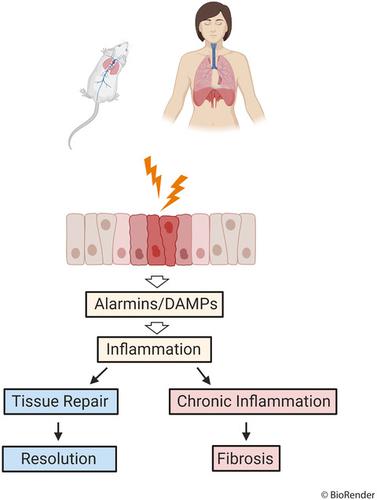当前位置:
X-MOL 学术
›
Clin. Transl. Immunol.
›
论文详情
Our official English website, www.x-mol.net, welcomes your
feedback! (Note: you will need to create a separate account there.)
The contribution of animal models to understanding the role of the immune system in human idiopathic pulmonary fibrosis.
Clinical & Translational Immunology ( IF 4.6 ) Pub Date : 2020-07-27 , DOI: 10.1002/cti2.1153 Tylah Miles 1, 2 , Gerard F Hoyne 3, 4 , Darryl A Knight 5, 6 , Mark W Fear 7 , Steven E Mutsaers 1, 2, 3 , Cecilia M Prêle 2, 3, 8
Clinical & Translational Immunology ( IF 4.6 ) Pub Date : 2020-07-27 , DOI: 10.1002/cti2.1153 Tylah Miles 1, 2 , Gerard F Hoyne 3, 4 , Darryl A Knight 5, 6 , Mark W Fear 7 , Steven E Mutsaers 1, 2, 3 , Cecilia M Prêle 2, 3, 8
Affiliation

|
Pulmonary fibrosis occurs in a heterogeneous group of lung disorders and is characterised by an excessive deposition of extracellular matrix proteins within the pulmonary interstitium, leading to impaired gas transfer and a loss of lung function. In the past 10 years, there has been a dramatic increase in our understanding of the immune system and how it contributes to fibrogenic processes within the lung. This review will compare some of the models used to investigate the pathogenesis and treatment of pulmonary fibrosis, in particular those used to study immune cell pathogenicity in idiopathic pulmonary fibrosis, highlighting their advantages and disadvantages in dissecting human disease.
中文翻译:

动物模型有助于理解免疫系统在人类特发性肺纤维化中的作用。
肺纤维化发生在一组异质的肺部疾病中,其特征是肺间质内细胞外基质蛋白的过度沉积,导致气体转移受损和肺功能丧失。在过去的十年中,我们对免疫系统及其对肺内纤维化过程的贡献的认识有了极大的提高。这篇综述将比较一些用于研究肺纤维化的发病机理和治疗的模型,特别是那些用于研究特发性肺纤维化中免疫细胞致病性的模型,强调它们在解剖人类疾病中的优缺点。
更新日期:2020-07-28
中文翻译:

动物模型有助于理解免疫系统在人类特发性肺纤维化中的作用。
肺纤维化发生在一组异质的肺部疾病中,其特征是肺间质内细胞外基质蛋白的过度沉积,导致气体转移受损和肺功能丧失。在过去的十年中,我们对免疫系统及其对肺内纤维化过程的贡献的认识有了极大的提高。这篇综述将比较一些用于研究肺纤维化的发病机理和治疗的模型,特别是那些用于研究特发性肺纤维化中免疫细胞致病性的模型,强调它们在解剖人类疾病中的优缺点。











































 京公网安备 11010802027423号
京公网安备 11010802027423号